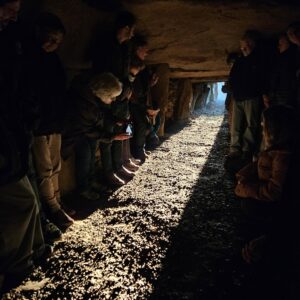
AN 18th Century country cottage in Trinity could be demolished and replaced by three modern four-bedroomed homes, garages and parking if a revised Planning application by developers is successful.
There have been two applications by Bridgewater Homes to demolish the cottage: the first was refused last October, following a successful appeal by local residents to a UK Inspector, when 142 people signed a petition opposing the plans. More than double that number have so far signed a new petition.
The threatened building is Ville-à-l’Evêque Cottage on La Rue de la Monnaie, built around 1735 and which has been part of the local rural landscape ever since.
The cottage is located immediately alongside the road and acts as a ‘pinch-point’ slowing traffic in what was once a country lane but which has now become a busy cross-Island route for traffic travelling from the Trinity Church area towards the Springfield Industrial Estate and the north-south La Grande Route de St Jean. Ironically, by narrowing the road and slowing the volume of traffic using the lane, it provides a modern function and gives the cottage added prominence as a landmark building.
The first application in 2019 was for two four-bedroomed houses and one five-bedroomed house. The new application is similar to the first, except that the five-bedroomed house has become a third four-bedroomed house.
Neighbours directly across the road from the cottage, Stephen and Jennifer Lawson, are leading lights in organising this petition to stop the demolition and redevelopment.
Stephen said: ‘Although there are objections to the sheer scale and location of the proposed development, at this stage our major concern is to save the cottage from demolition.’
Retired advocate Fred Benest, who has researched the history of the building, said: ‘It is obvious why people are opposed to its demolition. Not only is it a landmark building but it’s vital to preserving the rural character of the road. Almost 300 years old, it’s the only example of a vernacular granite cottage of its age that has survived in the area, and its setting next to a beautiful meadow is an integral part of the landscape.’
Originally named ‘Le Jardin du Bouillon’ (‘The Garden of the Bubbling Stream’), it was built on a plot inherited in 1735 by a younger son of the Nicolle family, who owned Bishopstown, a substantial farm holding nearby, which was demolished in the 1970s.
Advocate Benest added: ‘It is almost 300 years old. If it were 300 years old, I expect that it would be listed, but unfortunately Conservation Areas provided for by the Island Plan have yet to be designated. Although in recent times there have been unsympathetic changes made to it, these are on the rear of the cottage; the profile of the original cottage remains intact.
‘Although the cottage is not listed, the cottage clearly has both historic and environmental significance and is much appreciated by the local community. There have recently been calls for a more imaginative approach to the development of historic properties in the Island. In this case, the cottage could be redeveloped and extended to enhance its evident appeal, and, occupying an enviable position with a garden sloping down to a stream, would provide a very desirable family home. In the opinion of many local residents, to remove it would do irreparable harm to the character and integrity of the area.’
The architects for the proposed development have stated: ‘Since the refusal notice [for the first planning application] was received, the applicants and their team have liaised very closely with both the Planning officers and the Historic Building Officer and have undertaken considerable work to amend the design to a stage where we believe that the scheme is now acceptable in all respects and successfully addresses the original reasons for refusal.
‘The design has been substantially amended and full and comprehensive evidence has been supplied to justify the demolition of the existing building.’
Asked if there was not a case for demolishing a building so unsuited to the changed modern conditions of the locality, Jennifer Lawson replied: ‘As the proposed new buildings will have four bedrooms, it is reasonable to suppose that the purchasers will be families with children. If there is going to be an open area between the building and the road, it is likely that children are going to rush out into the road and not take any notice of the heavy volume of speeding traffic. Then there will be a possible death.’
Jennifer Lawson can be contacted by e-mail on jennythomas100@gmail.com
A copy of the petition is available to sign at Trinity Parish Hall or by sharing on ‘The Cottage Action Group’ page on Facebook.







